7 Once Favorite Fast-Food Chains We Rarely Visit Today
In the fast-food world, there is a lot of competition. Between the largest chains in America to dueling sandwich shops, coffee shops, and burger joints, there's an abundance of places to choose from. The brutal part for these rivaling companies? The competitiveness of the QSR market means that there will always be "winners" and "losers." When customers begin to show a preference for one chain over the other, the popularity of former favorites can fade faster than a flash in the pan. Fast-food chains are under pressure to maintain a stellar reputation while simultaneously pursuing innovative ways to stand out from their competitors and remain relevant with consumers.
Due to the nature of the industry, it's no surprise to see once-favorite places receive bad press, lose customers, and in some cases, even file for bankruptcy. Even fast-food restaurants with longstanding legacies may find themselves in a position where their best chance for survival hinges on the franchise's ability to quickly pivot and adapt to meet the ever-evolving market demand. As a result, they might even consider rebranding themselves, abandoning all that was once familiar in hopes of bringing customers back through their doors.
That being said, here are 7 once favorite fast-food chains that we used to be smitten with but now hardly visit. Then after giving this a read, be sure to check out 8 Restaurant Chains That Are Currently Shrinking.
Subway
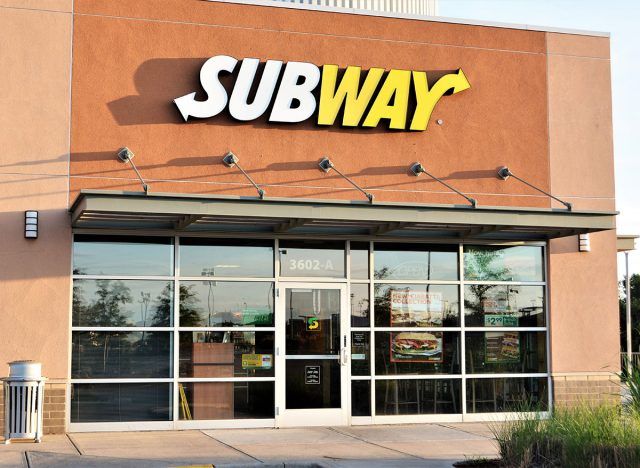
Subway has repeatedly tried to redeem itself from its bad rep of low-quality food. In 2021, Subway even went as far as launching an entire menu overhaul, giving itself a much-needed rebrand. That same year, Restaurant Business also reported that during 2020, the sub sandwich chain closed an estimated 2,200–2,400 of its store units, equating to roughly as much as 10% of its store units. While the '90s and early '00s may have been Subway's heyday, today the sandwich franchise is also up against a more saturated market, with sandwich chains like Jimmy John's, Potbelly, and Jersey Mike's Subs continuing to devour share within this niche market. Can subway make a viable comeback? Given the trajectory of this business over the last few years, only time will tell.
Boston Market
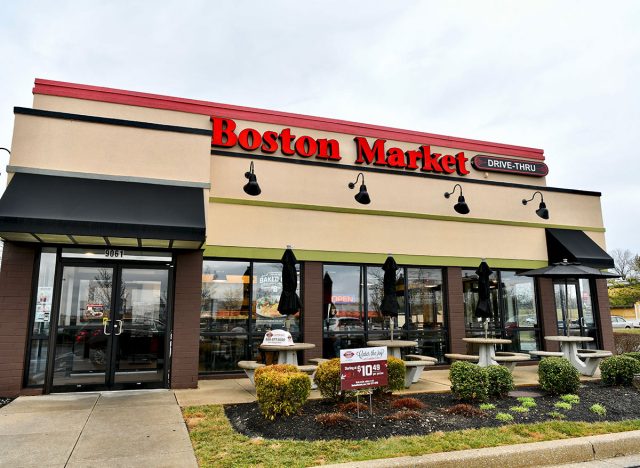
When you think of Boston Market, you may start to feel nostalgic for the '90s and warm, quick comfort food. Although some may not classify the restaurant formerly known as Boston Chicken as a fast-food chain, at one point in time, it was considered a viable franchise able to hold its own against competitors in the QSR category.
As Boston Market made attempts at customer retention by investing in marketing campaigns and coupon deals, unfortunately, their ambitions could not compensate for reported declines in food and customer service quality.
The company even filed for Chapter 11 bankruptcy in 1998, and McDonald's acquired it soon thereafter. However, the sanctuary of the Golden Arches only lasted but for so long, with McDonald's eventually selling the franchise to a private investment firm in 2007. The brand faced a notable decline in sales in the late 2010s, even reportedly shuttering 10% of its locations in 2019. Then in 2020, Boston Market Enterprises was passed off yet again, this time acquired by the online brand management agency Engage Brands, LLC.
Throughout this game of corporate hot potato (or hot rotisserie chicken, in this case), Boston Market has tried to remain resilient and hang in there. The acquisition by Engage Brands seems to have helped the company regroup to some degree, as Boston Market soon opened more new locations around the country. Hopefully, it's a sign that Boston Market is really ready to thrive once again.
Steak 'n Shake
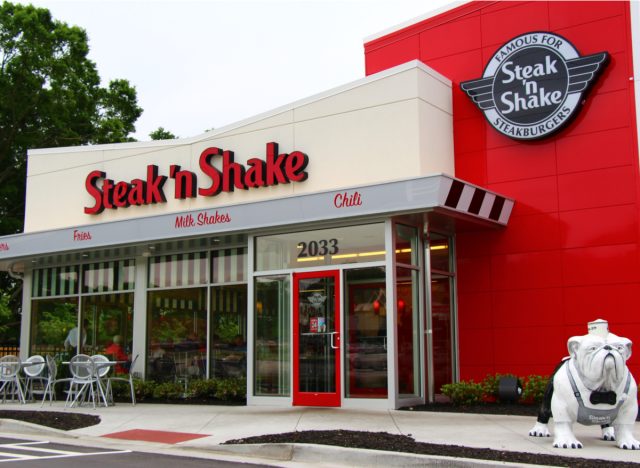
Founded in 1934—smack dab in the middle of the Great Depression—Steak 'n Shake has been privy to many highs and lows throughout its nearly 90-year-long run, and its longevity alone speaks volumes of the durability of this brand. But these days, when trying to decide on a burger to satisfy your cravings, chances are Steak 'n Shake is not the first fast-food spot that comes to mind, as the company's popularity began to wane in the late aughts.
"Experts point to a decline in the quality of service and food, starting in 2008, as the main culprit for the chain's declining popularity," Eat This, Not That! previously reported.
This soon led to store closings, and in 2021, Steak 'n Shake was on the verge of filing for bankruptcy. However, the company was able to dodge this bullet when its parent company, Biglari Holdings, managed to pay off its $153 million debt. Yet despite their best efforts—even reporting a $4.1 million profit in Q1'21—the fast-food franchise has still struggled to get itself together. In fact, it reportedly lost 40% of its revenues that same quarter. Although I'm rooting for Steak 'n Shack and hope for the best, it seems like this chain is up against many complicated obstacles, and I'm honestly not sure if it is capable of successfully rebounding. But hopefully, for their sake, they will prove me wrong.
Pizza Hut
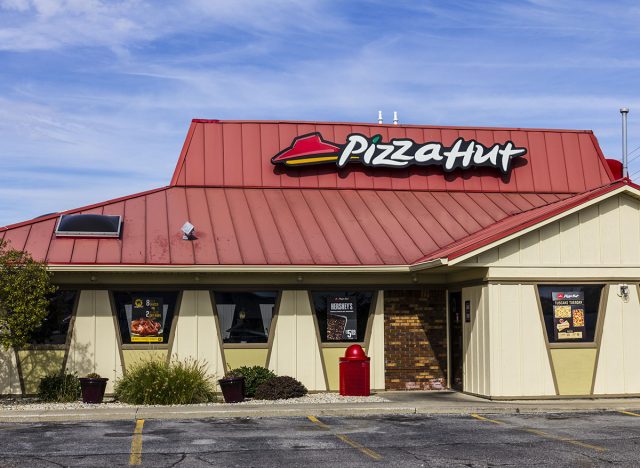
There's nothing like staying in and ordering a pizza. It's quick, easy, and convenient. But given the amalgam of local mom-and-pop pizza joints and fast-food pizza rivals, standing out in the pizza restaurant business is challenging. While Pizza Hut might be famous for its slogan, "no one out pizzas the hut," recent data shows otherwise.
According to Restaurant Business, research disclosed in the Technomic Top 500 Chain Restaurant Report found that Pizza Hut's year-over-year sales dropped by 2.2% in 2020. Meanwhile, Domino's sales increased by 17.6%, and Papa John's experienced a 15.9% increase, too. Pizza Hut has also endured a number of store closings, much of which has been attributed to the economic impact of the COVID-19 pandemic. During 2020, the chain reportedly closed upwards of 1,200 locations worldwide, and its biggest franchisee even filed for bankruptcy in response to being $1 billion in debt.
Quiznos
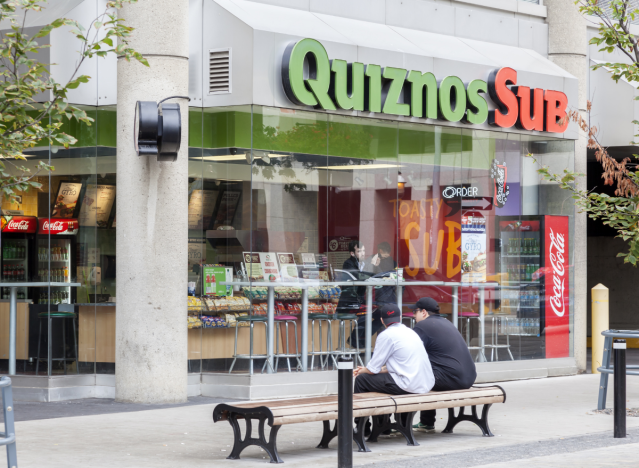
After opening its doors in 1981, Quiznos appeared to be on the up and up, rapidly expanding throughout the '90s and early aughts—that is, until the onset of the Great Recession in '07. The sandwich chain soon found itself feeling the impact of this period of economic downturn, closing about 90% of its locations over the next decade.
"Between 2007 and 2017, Quiznos shrunk from 4,700 U.S. locations to fewer than 400. We can find no other example of a chain that had grown to that size that has shrunk that much in such a short period of time,"Restaurant Business claimed in a 2018 article. In addition, Quiznos sales also reportedly dropped $1.9 billion in 2007 to $171 million in 2017. And much like many of the other fast-food chains noted here, they too had to resort to filing for bankruptcy in 2014.
But Quiznos isn't giving up. While they may only have a measly 170 locations as of June 2022, they're ready to make a comeback. According to QSR Magazine, the beloved toasted sub chain is expected to launch a new, innovative "globally inspired menu" and also intends to remodel its store units. So, perhaps we'll all find ourselves singing along to Quiznos' iconic "we love the subs" jingle once more in due time.
Carl's Jr.
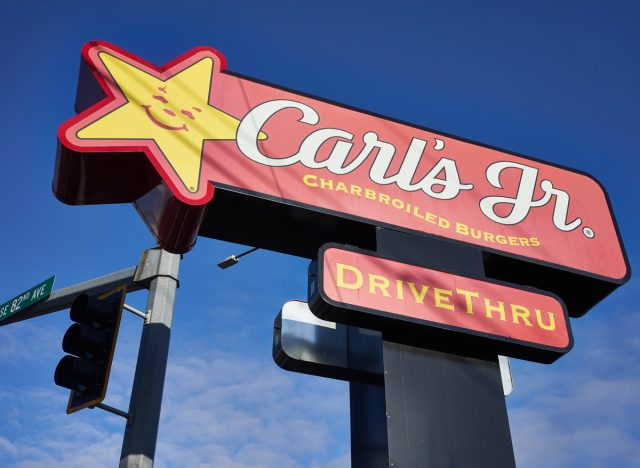
Anyone with access to a television has probably caught a commercial or two from Carl's Jr., especially in the mid-aughts when the company surprised everyone by recruiting Paris Hilton as its brand ambassador.
But despite Ms. Hilton's notoriety and the franchise's over 80-year legacy, Carl's Jr. has still faced its fair share of setbacks. Trailing behind regional chains like In-N-Out-Burger and Whataburger, a 2021 report from Statista assessing the sales of leading burger chains in the U.S. shows Carl's Jr. ranking in 11th place with just over $1.5 million in sales.
White Castle
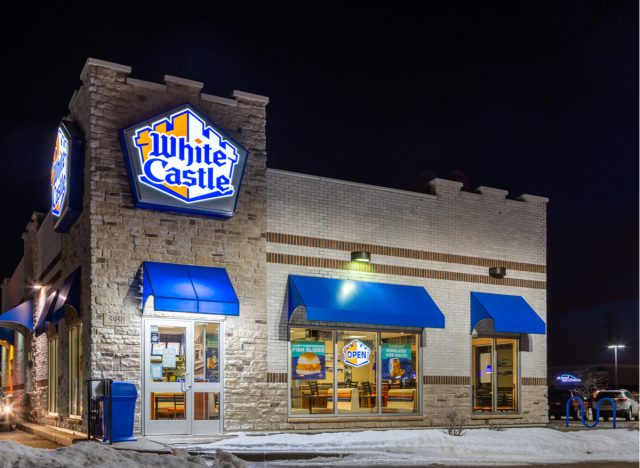
There was always some hype around White Castle, thanks to its mini burgers and regal medieval storefront. Founded in 1921, White Castle is 100 years old, holding the honor of being the "oldest American fast-food chain." Is that an accomplishment? Absolutely. But the longer you stay in business, the greater the likelihood for things to unravel—and that is exactly what has been happening to this chain, despite its ability to stand the test of time.
One aspect of White Castle's business model that differentiates it from other well-known fast-food chains is that it does not franchise its restaurants. Considered a niche burger chain, White Castle maintains a limited number of locations scattered throughout the U.S. Though this hasn't seemed to pose an issue for the brand in the past, between 2015 to 2020, White Castle closed approximately 30 of its restaurants. Now, some of us are left wondering if its narrow reach is somehow connected to the fast-food chain's unexpected decline. As of 2022, only about 349 White Castle locations remain.










